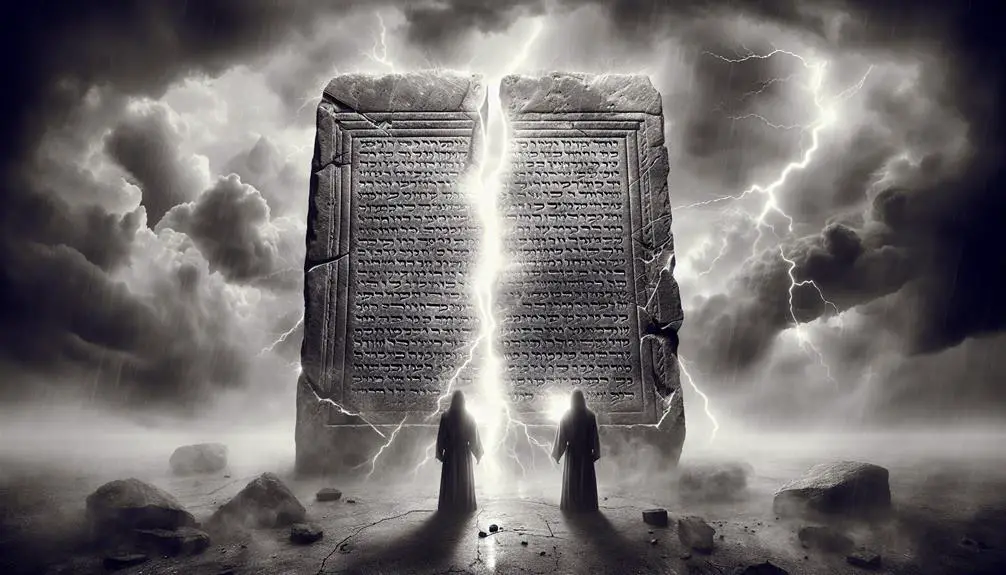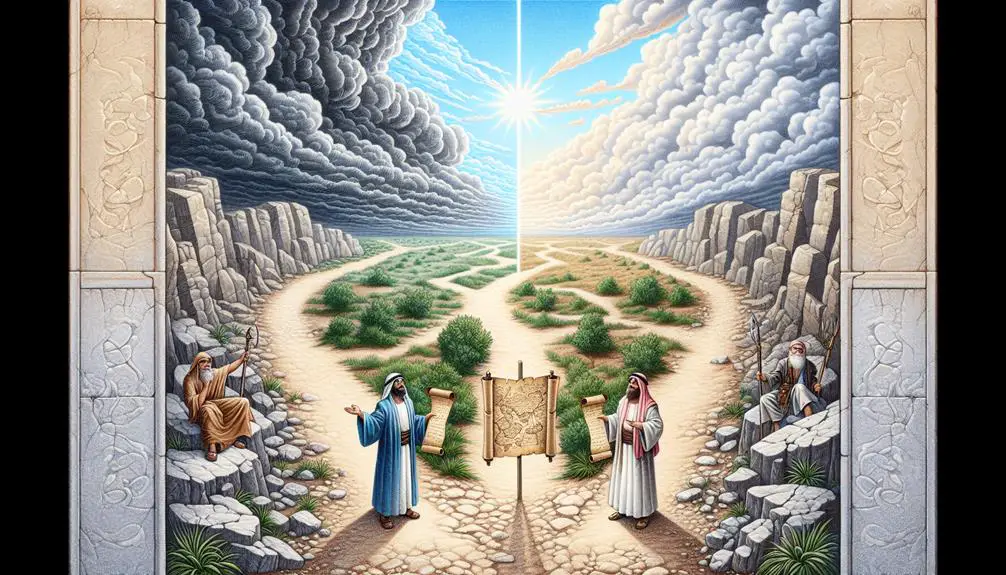Uncover the deep-rooted dissension in biblical stories, revealing timeless lessons on conflict, envy, and the human condition.

Dissension in the Bible
You've likely heard of Cain and Abel, where envy led to the ultimate betrayal: fratricide. This narrative sets the stage for understanding dissension within the Bible, a theme that reoccurs in tales of jealousy, rebellion, and conflict, such as those involving Joseph and his brothers or David and Saul.
These stories aren't just ancient history; they offer insights into human nature and the consequences of our actions. As you consider these episodes of discord, you might find yourself reflecting on the complexity of relationships and the lessons they impart about resolving conflicts in today's world.
Key Takeaways
- Biblical narratives often showcase the destructive outcomes of envy and jealousy in human relationships.
- Stories of rebellion against divine or appointed leadership emphasize the severe consequences of insubordination.
- Conflicts, whether from sibling rivalry or leadership disputes, underscore the importance of resolution for growth and unity.
- Despite the challenges of dissension, the Bible highlights opportunities for learning, forgiveness, and the strengthening of bonds through adversity.
Cain and Abel: Envy's Outcome

Cain's envy of Abel led to the first recorded act of murder, illustrating the destructive power of unchecked jealousy. This narrative, deeply embedded in the fabric of religious teachings, provides a profound exploration of sibling rivalry and its potential to escalate into devastating consequences. The story of Cain and Abel serves as a poignant reminder of the moral lessons inherent in controlling one's darker impulses.
Unpacking this account, you're invited to consider the broader implications of their conflict. It's not merely a tale of rivalry but a cautionary narrative about the dangers of allowing jealousy to fester unaddressed. The tragedy of Cain and Abel offers critical insights into human behavior, emphasizing how unchecked emotions can lead to irreversible actions.
Furthermore, this story underscores the importance of self-awareness and accountability. It's a vivid illustration of how personal grievances can overshadow moral judgment, leading to acts that can't be undone. The moral lessons gleaned from Cain and Abel's story are timeless, urging you to reflect on the consequences of envy and the value of harmony over discord.
Joseph's Brothers: Betrayal and Jealousy

Reflecting on the story of Cain and Abel's destructive jealousy, we encounter a similar theme of envy and betrayal in the narrative of Joseph and his brothers. The complex family dynamics and Joseph's dream interpretations serve as the catalyst for the ensuing drama. Joseph, favored by their father Jacob, becomes the target of his brothers' jealousy, ultimately leading to his betrayal.
Aspect |
Description |
|---|---|
Family Dynamics |
Joseph's favored status among his siblings kindles jealousy and resentment, illustrating the profound impact of parental favoritism on sibling relationships. |
Dream Interpretations |
Joseph's ability to interpret dreams, including those foretelling his rise to power over his family, exacerbates the existing tensions, highlighting the role of personal abilities in fueling family discord. |
This narrative delves into the destructive potential of jealousy within family structures, echoing the earlier story of Cain and Abel while providing a nuanced exploration of the consequences of envy. Joseph's journey from being sold into slavery to his eventual rise to power in Egypt underscores the complexity of human emotions and the unpredictable paths of life shaped by familial betrayals.
Moses and Korah: Rebellion Punished

In the biblical narrative, the story of Moses and Korah vividly illustrates the severe consequences of rebellion against divinely chosen leadership. This episode is a critical study in leadership challenge and Divine judgment, underscoring the peril of dissent against God's appointed.
Korah, along with Dathan, Abiram, and 250 community leaders, challenged Moses' authority, suggesting that the entire congregation was holy and questioning why Moses and Aaron set themselves above the Lord's assembly. This act of defiance against Moses, and by extension against God, led to dramatic Divine judgment:
- Swift and severe punishment: The earth opened up and swallowed Korah, Dathan, Abiram, and their families, while fire consumed the 250 men offering incense.
- A clear message: The punishment served as a stark warning to the Israelites about the consequences of insubordination against God's chosen leaders.
- Establishment of Aaron's priesthood: This event reaffirmed Aaron's divine selection as the high priest, silencing any doubts about his and Moses' leadership.
- Enduring legacy: The narrative of Korah's rebellion is referenced throughout scripture as a cautionary tale against the dangers of challenging divinely appointed authority.
Through this analysis, you're reminded of the foundational biblical principle that rebellion against God's appointed leaders carries profound consequences.
David and Saul: Royal Conflict

Shifting focus to another significant biblical conflict, the rivalry between David and Saul epitomizes the complexities of divine favor and human jealousy. Initially, David's rise begins with his boldness in accepting Goliath's challenge, a pivotal moment that cements his status as a favored individual under God's watchful eye. Yet, this very act sows the seeds of discord between David and King Saul, marking the onset of a tumultuous relationship. Saul's envy grows as David's victories and popularity surge, illustrating the destructive nature of jealousy and the fragility of human ego when confronted with perceived threats to power and prestige.
Amidst this escalating tension, Jonathan's friendship with David emerges as a beacon of loyalty and love. Jonathan, Saul's son, chooses to align himself with David, despite the potential for familial conflict. This relationship serves as a counterpoint to the animosity between Saul and David, highlighting themes of fidelity, sacrifice, and the transcendence of personal bonds over political ambition. As the narrative unfolds, the tragic trajectory of Saul's reign, consumed by paranoia and obsession, underscores the profound costs of allowing personal vendettas to override kingly duties and divine mandates.
Paul and Barnabas: Missionary Disagreements

Another pivotal conflict within the biblical narrative is the disagreement between Paul and Barnabas, which highlights the challenges of maintaining unity and direction in early Christian missionary efforts. This dispute, rooted in differing opinions over travel strategies and team composition, underscores the complexities of collaborating in mission work.
- Missionary Strategy: Paul and Barnabas had distinct visions for their missionary journey, revealing a fundamental divergence in approach.
- Team Composition: The crux of their disagreement centered on whether to include John Mark in their travels, with Barnabas advocating for his inclusion and Paul opposing it due to past disappointments.
- Conflict Resolution: The resolution involved a pragmatic separation of their missions, allowing each to pursue their vision while still advancing the broader goals of early Christian evangelism.
- Implications for Unity: This episode demonstrates that even in the face of sharp disagreements, effective conflict resolution can lead to diversified efforts that enrich the collective mission.
The disagreement between Paul and Barnabas teaches you that conflicts, when approached with a commitment to mutual respect and understanding, can offer opportunities for growth and diversification in mission strategies. It serves as an enduring lesson in the importance of balancing unity with individual convictions within any collaborative endeavor.
Frequently Asked Questions
How Has the Theme of Dissension Been Interpreted Differently Across Various Christian Denominations?
You'll find that different Christian denominations interpret the theme of dissension based on their denominational origins and their view of scriptural authority.
For example, denominations deeply rooted in tradition might see dissension as a challenge to unity, whereas others, prioritizing individual interpretation of scripture, may view it as a vital part of faith development.
This variation showcases the wide spectrum of beliefs and practices within Christianity, reflecting both historical contexts and theological perspectives.
What Role Does Forgiveness Play in Resolving Instances of Dissension Mentioned in the Bible?
When the chips are down, forgiveness emerges as a cornerstone in mending fences after conflicts.
It's not just about Divine Mercy sweeping in; it's also about Personal Accountability. You're encouraged to reflect, repent, and reconcile.
This process doesn't just patch things up temporarily; it fosters deep healing and understanding, often transforming relationships fundamentally.
Therefore, forgiveness is pivotal, acting as both a salve and a bridge in resolving disputes, guiding individuals towards unity and peace.
Are There Instances Where Dissension or Conflict in the Bible Is Seen in a Positive or Necessary Light for Growth and Understanding?
Yes, some conflicts are viewed positively, as they lead to growth and understanding. Paul's Reprimand of Peter for hypocrisy in Galatians showcases how confrontation can restore unity and adherence to the gospel.
Similarly, Apostolic Disputes, like those over circumcision, ultimately strengthened the early church by clarifying beliefs and practices. These instances highlight that, when approached constructively, dissension can foster deeper insight and solidify communal bonds.
How Do Modern Biblical Scholars Reconcile the Moral and Ethical Dilemmas Presented by These Stories of Dissension With Contemporary Values?
Modern biblical scholars tackle these complex issues by delving into the historical context and examining how cultural adaptation influences our understanding of ancient texts.
You'll find they often interpret these narratives as reflections of their times, using them to teach rather than dictate morality.
Through critical analysis, they bridge the gap between past and present, showing you how to apply age-old lessons in a way that aligns with today's values.
In What Ways Have These Biblical Stories of Dissension Influenced Christian Thought on Conflict Resolution and Reconciliation Within the Church Community?
You're exploring how stories of conflict have shaped Christian approaches to resolving disputes within the church. These narratives offer insights into leadership styles and community dynamics pivotal for fostering reconciliation.
Conclusion
Throughout biblical narratives, dissension emerges as a potent force, shaping destinies and divine lessons. From Cain and Abel's tragic envy to the strategic disagreements between Paul and Barnabas, these stories underscore the complexity of human relationships and the divine's intricate role in guiding moral outcomes.
Like a glitch in modern software disrupting harmony, discord in these tales highlights the eternal struggle between human frailty and the quest for moral rectitude, urging a thoughtful reflection on our own interpersonal conflicts.



Sign up